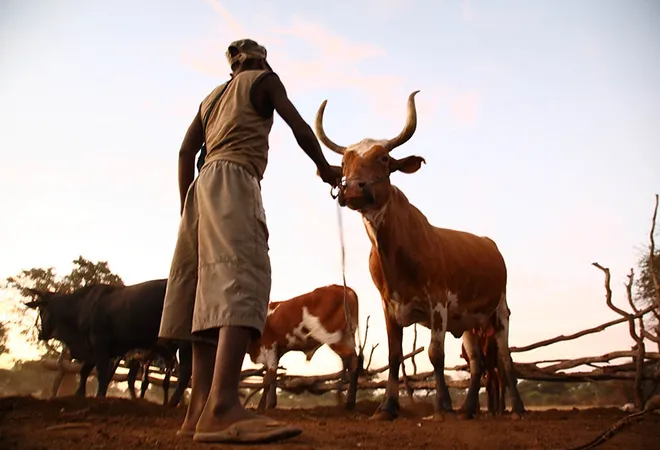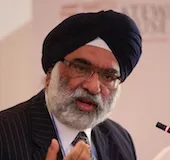
In recent years, Mozambique in South East Africa has acquired greater strategic attention. Its location on the Mozambique channel and its reserves of coal and gas has made it an attractive Foreign Direct Investment (FDI) destination. The stability and security of Mozambique is a cause of international concern.
Since 2017, an insurgency in the northern region of Cabo Delgado Mozambique is growing. A million people have been internally displaced, and are facing food shortages. The insurgency by Ahlus Sunnah wal Jamaah (ASWJ), has links to Islamic courts in Somalia, and the IS in the Sahel. Since March 2020, attacks have intensified.
The situation
The insurgency is homegrown since local people felt marginalised. The gains from rubies and natural gas extracted in the region did not percolate to the province, which is the farthest from Maputo and is Muslim-dominated. Some analysts see it is a leftover of history that is ignited by newer challenges and contradictions. Besides the humanitarian crisis and the challenge of ASWJ, Mozambique is trying to protect investments in its gas fields and related infrastructure, which has made it a focal point in the region.
The offshore area off Cabo Delgado is the Rovuma Basin. It is estimated to have over 100 trillion cubic feet of recoverable natural gas. Energy Multinational Companies (MNCs) rushed to participate in the opportunity. The US energy firm Anadarko and the Italian Eni held the two largest offshore investments in north-east Mozambique. France has a US $20 billion FDI which it has now suspended. India, Japan, USA, Malaysia, and China are amongst the investors in the US $60 billion gas sector, which is now threatened by the insurgency.
Besides the humanitarian crisis and the challenge of ASWJ, Mozambique is trying to protect investments in its gas fields and related infrastructure, which has made it a focal point in the region.
Mozambique has 1.975 million tons (MMst) of coal reserves with several Indian and Brazilian players participating in the logistically difficult operation of extraction in the Tete province.
The regional dimension
Mozambique shares land borders with Tanzania, Malawi, Zambia, Zimbabwe, Eswatini, and South Africa. Comoros, Madagascar, and several French islands lie to its east around the Mozambique Channel. It sees a third of global tankers use its sea lanes.
The region is concerned with the growing insurgency and its contagion. Cross-border movement of insurgents is from Tanzania, which has borders with Democratic Republic of Congo (DRC), Rwanda, and Burundi. Some analysts told the author that several insurgents are linked to eastern DRC, and from DRC to Tanzania. They support the insurgency in both DRC and Mozambique. In this, the role of Rwanda is valued by Mozambique, because they believe that Rwanda plays a role in keeping the lid on such matters in eastern DRC and can stem the flow of insurgents. Rwanda on 9 July sent 1,000 troops to Cabo Delgado to support the Mozambique defence forces.
Rwanda is not part of the Southern Africa Development Community (SADC). The SADC has 16 members. SADC has the initial role in providing security in its neighbourhood. The African Union (AU) confers the Regional Economic Communities (RECs) primacy in dealing with issues in their regions. For such purposes, the RECs have their standby brigades. This is part of the MoU on Peace and Security (P&S) amongst the AUC and RECs.
There are divergences within the SADC at the timing and pace of action, which has prevented it from being the first responder to this threat to P&S in Mozambique.
The SADC under the subsidiarity concept is to have its force for rapid deployment. Requirements are assessed by a technical team, which needs political unanimity followed by military acceptability. In this case, there are divergences within the SADC at the timing and pace of action, which has prevented it from being the first responder to this threat to P&S in Mozambique. Mozambique itself was initially hesitant as it believed that its military, if provided with material support, could deal with the situation.
The SADC Brigade announced in August 2008, consists of military, police, and civilians from member states. Its role is to provide observation and monitoring missions; peace support missions; interventions for restoration of P&S at the request of a member state; and to prevent the spread of conflict to neighbouring States. The SADC Brigade works at the behest of the SADC Organ on Politics, Defence and Security Cooperation and operates under the SADC Committee of Chiefs of Defence staff. It has a training centre in Zimbabwe.
The EU is always ready to support African Standby Brigades but would prefer that this be done in times of peace.
The SADC troika consists of Mozambique, the current Chairman; Tanzania as outgoing chair; and Malawi, the chair for 2022. The defence committee troika is chaired by Botswana, replacing Zimbabwe, with South Africa as the next Chair. They met as a double troika with the Summit Troika (the two troikas are not congruent) on 27 May 2021. They agreed to a summit to respond to the situation in Cabo Delgado. The 23 June summit chaired by Mozambique was attended by eight presidents and ministers from other members. They looked at the recommendation by the Defence committee and agreed to the mandate for the SADC Standby Force Mission to support Mozambique.
This three-month mission is to start on 15 July. It is the first ever SADC military intervention. It is unlikely to succeed unless it secures financial and material support from other friends, including the European Union (EU). The EU is always ready to support African Standby Brigades but would prefer that this be done in times of peace. Invariably, the requests for assistance come when deployments are to be made.
The technical team led by Brigadier Michael Mukokomani of Botswana, as Chief of Staff of the SADC Standby Force had proposed a 3,000-troop contingent. While details are not yet announced, the deployment may have three battalions of 600 troops each and a brigade HQ. Two squads of 70 special forces each and engineers, signals and logistics groups of 100 each are proposed. Two patrol vessels, two submarines, and helicopters, transport and surveillance aircraft as well as drones are requisitioned. This is the most widespread multiforce operation in Africa since most others have been army operations. SADC is contending with rival ambitions to appoint commanders for the brigade. The natural role ought to be to give the command to the largest troop contributor.
International partners
The US has begun training Mozambique special forces. Portugal, which has old colonial links with Mozambique, is providing material and intelligence support. Mozambique obtained support of the Russian and South African armed private contractors with limited success. A concern in the region is to avoid having too many players involved on an unstructured basis that will create problems of coherence. Ideally, a SADC brigade should be the best option that is supported by friendly countries.
A concern in the region is to avoid having too many players involved on an unstructured basis that will create problems of coherence.
The Mozambique Armed Forces also need to be further supported in counterinsurgency, motivation, material, and the like. This aspect has issues, as some partners believe that elements of the military often trade their weapons to the insurgents either out of sympathy, or more likely for cash.
Foreign partners realise that the only boots on the ground will be Mozambique, SADC or Rwanda and if these prove inadequate then mercenary hirings will again start. These are best avoided.
Mozambique’s instability will have an impact on the Indian Ocean, which is now part of the Indo-Pacific concept particularly for India, Japan, and France. An enhanced focus on maritime security in the Mozambique channel, which is a strategic tanker route directly impacted by the insurgency, awaits cohesive action. Thus, besides the countries helping Mozambique, India, and France, in particular, have active programmes in the western Indian Ocean and are taking a close look around the Mozambique channel. India and France can prepare concerted action to keep the maritime zone safe for traffic and offshore investments.
Besides the countries helping Mozambique, India, and France, in particular, have active programmes in the western Indian Ocean and are taking a close look around the Mozambique channel.
India has important FDI in coal ventures and the gas sector in Mozambique. An analysis based on Ministry of Finance data shows that between April 1996-March 2021, Mozambique is the largest FDI recipient from India. It obtained US $3,234 million, which is 37 percent of Indian non-Mauritius FDI into Africa. Mozambique has US $772 million concessional Lines of Credit from India. Over the next three years, Indian companies’ activity and exposure to Mozambique is set to rise. A large natural gas source close to India with no geostrategic chokepoints, devoid of West Asian political vagaries, and open to international investment makes Mozambique a valuable partner. China, Japan, and Korea have also seen the same logic.
It is, thus, reason enough for India and France to be jointly taking a look at protecting the investments and the stability of Mozambique, which is an important partner.
Mozambique’s acceptance of support provides room for India to counter terrorism, protect investments, provide HADR and maritime security. The Cabo Delgado problem will not wither away. A military containment with a development effort will be necessary. Development support is already starting to come from the World Bank for the Agency for Integrated Development of the North (ADIN). India is providing both development and defence support over the years.
Mozambique’s acceptance of support provides room for India to counter terrorism, protect investments, provide HADR and maritime security.
Indian requirements for gas and coal will not diminish soon. It is thus imperative to work with Mozambique to further what India has done for some years with greater vigour. Working with France, the EU and USA can become a new coordinated effort for protection of a friendly and strategic country. Mozambique's defence preparedness will also act as a buffer between the insurgents and India's investments in Mozambique.
The views expressed above belong to the author(s). ORF research and analyses now available on Telegram! Click here to access our curated content — blogs, longforms and interviews.




 PREV
PREV


